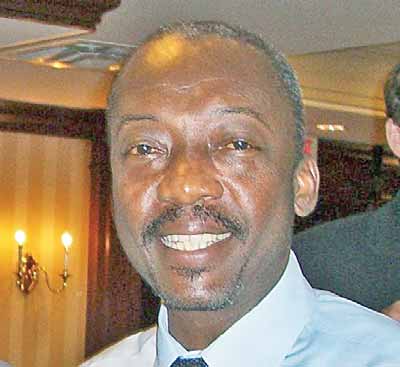|

Dukens Raphael of the Confederation of Public and Private Sectors
Workers of Haiti (CTSP) in Vancouver last week
CUPE: How are civil society groups,
unions, and other community organizations
working together?
RAPHAEL: If there’s something positive
January 12 has brought to us, it’s
that — putting aside all the differences
and divergences between civil
society organizations that we’ve had
before — we’re sitting down together
to try and fi nd a way out of this situation.
A number of the labor councils
and the larger labor organizations
(such as Public Services International
and Education International) have sat
down together. There were a number
of commitments made for action.
Among those was that we would try
to work in unity as labor. The same
thing is happening for agriculture
workers groups, women’s groups,
youth groups, etc. What we’re getting
a glimpse of here is that if the government
could work with civil society
groups, we could get out of this situation.
The problem is that, even
though civil society organizations are
doing this work, the government just
ignores it and doesn’t do any work.
For example, the Haitian government
presented a plan for reconstruction
in New York on March 31. But there
was no debate beforehand — no input
from civil society organizations.
Instead, they’re imposing a plan on
us. Unfortunately, I can pretty much
guarantee that it won’t work.
CUPE: So, following this meeting of
labor organizations, what message
have you been trying to send to international
organizations, in terms of
how they can support the relief and
reconstruction efforts?
RAPHAEL: In terms of reconstruction,
we state very clearly that the
reconstruction effort must come fi rst
and foremost from Haitians. We need
to decide what we need from you,
then we will ask for help. We may
need expertise, know-how, but we
need to decide what that is fi rst. It’s
not up to the Americans and theinternational community to decide
what we need. I sit here with you,
and yet I cannot tell you what’s in
the reconstruction plan. Somebody
will say we got this plan from the
Haitian government, but we don’t
even know what it is, and we’re
Haitian. Even Colin Powell, in a
recent article, was willing to admit
that many of Haiti’s problems were
caused by the Americans and the
French.
I’ll give you two examples.
After Haiti’s declaration of independence,
the United States was opposed
to Haiti’s participation in the
Congress of Nations. The U.S. didn’t
want to recognize Haiti as a nation.
France, a colonizing country, made
Haiti pay to be recognized: 150,000
pieces of gold, which is the equivalent
of $20 billion today. But that’s a
whole other discussion. People say
that Haiti is the poorest country. It’s
not. It is the most exploited. All our
resources have been stolen. I like
American and French people, but
you need to recognize the historic
wrongdoings that have been committed
by the colonizing countries.
CUPE: And if they don’t recognize
this, then they won’t recognize how
they’re repeating the same patterns
now?
RAPHAEL: Exactly. The last two
coups d’etat — the 1991 coup that
lasted three years, and Aristide
came back in 1994, and the next
one — demonstrate this. Aristide
made a lot of mistakes, but that
didn’t justify taking out the president
who was duly elected. And
we don’t want a coup d’etat now
either. We’re opposed to the policies
of René Préval, but we want him to
fi nish his mandate so that when he
goes, the democratic project process
continues. |